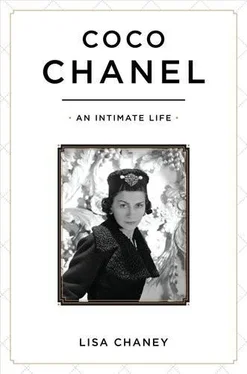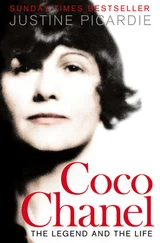
Late in that summer of 1940, when Gabrielle had been reinstated at the Ritz, having accepted the one small room offered her, she sent all her best furniture back to her apartment above the salon on rue Cambon. And whatever her private thoughts about the occupation, there were two immediate tasks Gabrielle was now obliged to fulfill. One was a task she wished to perform; the other was an onerous one she was forced into.
When she had closed her couture house, her workers had been left without work or compensation. After the armistice, when the German propaganda campaign was intent on having it appear that France was getting back on its feet, educational establishments, businesses, the law courts, et cetera, were reopened. And at this point, Gabrielle’s rejected workforce succeeded in taking her to an industrial tribunal. Under the excuse of “act of war” or “emergency action,” Gabrielle had dismissed them without any notice or compensation. The court rejected this plea, and she was obliged to pay her employees the wages they were due.
Gabrielle’s second duty was to find her nephew. That September of 1940, when the Germans began releasing most of the three hundred thousand pre-armistice prisoners, her imprisoned nephew, André, was not among them. Preoccupied about his delicate health, his aunt was determined to bring about his release. A young aristocrat of her acquaintance, Louis de Vaufreland, told her he knew a German who might be able to help her. This gentleman was named Hans Günther, Baron von Dincklage. He spoke fluent French and English (his mother was English) and was the archetypal Aryan. Tall, blond, blue-eyed von Dincklage was the embodiment of entertaining charm. He suggested that the person Gabrielle needed was an old friend of his, a cavalry captain, Theodor Momm. 9
Momm’s family was in textiles, and he had been deputed to mobilize the French textile industries, with a view to siphoning off the profits for the German war effort. Gabrielle’s persuasion was effective, and Momm reopened a small textile mill in the north of France. He then convinced his superiors that the owner was the famous Chanel, and that her nephew was the person needed to run the reinstated mill. Gabrielle was hugely relieved when André was at last released.
By this time, Gabrielle and von Dincklage had had cause to meet on a number of occasions. Gabrielle found the German’s charm and well-bred attentiveness throughout these proceedings most seductive. If she may have experienced any initial doubts about associating herself with the enemy, they were put aside, and she and von Dincklage became lovers. This affair was to endure for several years.
Gabrielle was careful to appear discreet, confining herself a good deal to her apartment on rue Cambon, her room at the Ritz and visits to an inner circle of friends, including the Serts, Serge Lifar, Jean Cocteau, Antoinette d’Harcourt and Marie-Louise Bousquet. Aside from that, there was her handsome lover. In an occupied city, where it was soon impossible not to take sides, Gabrielle appears to have convinced herself that she could have an affair with a German and live immured. For someone of her intelligence, she cannot possibly have believed that such catastrophic events in her own country and beyond didn’t concern her.
But Gabrielle’s attitude didn’t have much to do with intelligence; it was something more elemental than that. She had learned young to put self-preservation before most other things, and one of her clearest intentions throughout the war was just that: survival. As someone recently observed who was acquainted with her then, when he was a boy: “I don’t think it was a question of politics. [She] wanted to serve her own interests and maintain her lifestyle.” 10While this may have been ignoble, there were many who felt the same. Gabrielle and most of her friends were reluctant to ask too many questions about the oppression by their conquerors.
It has often been said that while Gabrielle was very wealthy, if ever the health of her business was in doubt, like many another who had started out poor, she reacted with an irrational fear of returning to that state. And perhaps to salve the guilt she must have had for pleading poverty and cutting off her brothers, she took up various public charitable activities, such as the patronage of Jean Marais’s regiment in the first months of war. Gabrielle had time on her hands and threw herself into the project, looking after every last detail. Other examples of Gabrielle’s charity were kept strictly private. For example, large sums were donated to a mental home in which the ex-courtesan Liane de Pougy was involved. 11In her later years, she contacted the solicitor at Aubazine and made a secret donation to the convent. (It is also said that over the years, she made occasional very discreet trips to the convent to visit the nuns.) 12
Returning to Gabrielle’s liaison with her German, one explanation for her actions was that her repeated losses in love had hardened her. Indeed, Cocteau would say that Gabrielle was “a pederast,” that her sexual appetites were virile and that she set out to conquer like a man. This attitude, while serving Gabrielle’s sexual needs, did little to ground her emotions. But while she was not without blame in failed loves, Gabrielle had lost love so many times already that she had little faith in the possibility of its enduring.
There was no question that had Arthur Capel asked her, all those years ago, Gabrielle would have married him. Quite possibly, in the end, this marriage would have foundered. While always believing in preserving the differences between men and women, Gabrielle also wanted desperately to be taken as an equal. However, her times, her upbringing and her social position, in combination with her powerful personality, had seen to it that this rarely happened. In her youth, women were seldom allowed that kind of scope. And for all Capel’s forward thinking, in marriage he had chosen the more traditional woman. Ironically, Diana Wyndham’s own position regarding scope was that she hadn’t easily accepted her husband’s keeping a mistress.
Gabrielle was more than equal to most men, but without the example of an even half-decent parental relationship, where the balance of power — despite its ups and downs — ultimately swings back and forth so that each partner feels loved, needed and found worthy, she had no positive example. Despite her belief that a long-term, stable relationship was what she wanted, in many ways Gabrielle had not developed the emotional maturity to make it happen. When young, she had luxuriated in being feminine and seduced, but this way of being wasn’t sufficient, hadn’t given enough scope for her intelligence and abilities.
Sadly, she appears to have found it impossible, really, to conduct a relationship without either dominating or being dominated, and each time this led, eventually, to her frustration. She was remarkably able at managing the practicalities of her own and others’ lives; friends were many, many times deeply grateful for her vital support. But like her great contemporary and semifriend Colette, who so publicly wrestled with squaring the problem of love and independence, Gabrielle found real mutual love nearly impossible. They were two highly intelligent women, whose lives and loves epitomized versions of the same problem: “Is there love without complete submission and loss of identity? Is freedom worth the loneliness that pays for it?” 13
In her own way, Colette had arrived at a better accommodation than Gabrielle ever would. Gabrielle remained vulnerable to emotional insecurity and loneliness. With time, suffering and disillusionment, she had become as much the seducer as the seduced. And she had long since learned to enjoy a sexual relationship that didn’t necessarily involve love. But while harboring few illusions, at the same time, she was also vulnerable in that she was alone and wanted to feel loved.
Читать дальше













